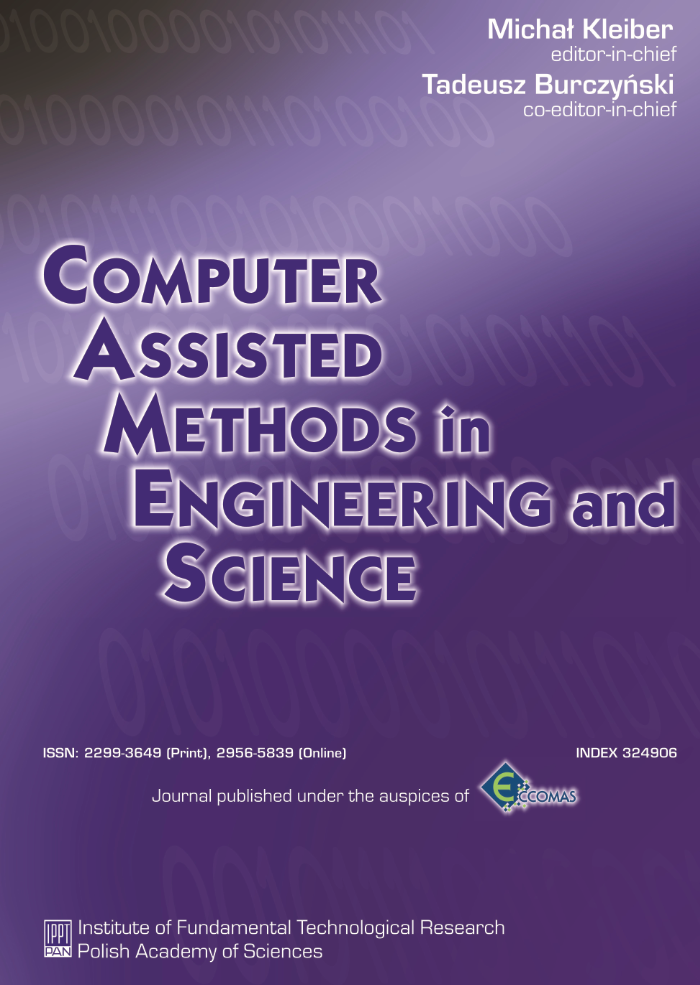Abstract
In this paper, a meshless pseudospectral method is applied to solve problems possessing weak discontinuities on interfaces. To discretize a differential problem, a global interpolation by radial basis functions is used with the collocation procedure. This leads to obtaining the differentiation matrix for the global approximation of the differential operator from the analyzed equation. Using this matrix, the discretization of the problem is straightforward. To deal with the differential equations with discontinuous coefficients on the interface, the meshless pseudospectral formulation is used with the so-called subdomain approach, where proper continuity conditions are used to obtain accurate results. In the present paper, the differentiation matrix for this method is derived and the choice of a proper value of the shape parameter for radial functions in the context of the subdomain approach is studied. The numerical tests show the effectiveness of the method when using regular or unstructured node distribution. They confirm that the approach preserves well-known advantages of the radial basis function collocation method, i.e., rapid convergence, simplicity of the implementation and extends its usage for problems with weak discontinuity.
Keywords:
RBF pseudospectral method, meshless method, interface problem, subdomain approachReferences
2. G.R. Liu, Mesh-free Methods, Moving Beyond the Finite Element Method, CRC Press, Boca Raton, USA, 2003.
3. G.E. Fasshauer, Meshfree Approximation Methods with Matlab, World Scientific Publishing, Singapore, 2007.
4. M.D. Buhmann, Radial Basis Functions: Theory and Implementations, Cambridge University Press, Cambridge, UK, 2003.
5. W.R. Madych, Miscellaneous error bounds for multiquadric or related interpolators, Computers & Mathematics with Applications, 24(12): 121–138, 1992, https://doi.org/10.1016/0898-1221(92)90175-H.
6. E.J. Kansa, Multiquadrics – A scattered data approximation scheme with applications to computational fluid-dynamics – I: Surface approximations and partial derivative estimates, Computers & Mathematics with Applications, 19(8–9): 127–145, 1990, https://doi.org/10.1016/0898-1221(90)90270-T.
7. E.J. Kansa, Multiquadrics – A scattered data approximation scheme with applications to computational fluid dynamics – II: Solutions to parabolic, hyperbolic, and elliptic partial differential equations, Computers & Mathematics with Applications, 19(8–9): 147–161, 1990, https://doi.org/10.1016/0898-1221(90)90271-K.
8. A. Krowiak, Radial basis function-based pseudospectral method for static analysis of thin plates, Engineering Analysis with Boundary Elements, 71: 50–58, 2016, https://doi.org/10.1016/j.enganabound.2016.07.002.
9. W. Chen, Z.-J. Fu, C.S. Chen, Recent Advances in Radial Basis Function Collocation Methods, Springer, 2014.
10. B. Martin, B. Fornberg, Using radial basis function-generated finite differences (RBF-FD) to solve heat transfer equilibrium problems in domains with interfaces, Engineering Analysis with Boundary Elements, 79: 38–48, 2017, https://doi.org/10.1016/j.enganabound.2017.03.005.
11. A. Taleei, M. Dehghan, An efficient meshfree point collocation moving least squares method to solve the interface problems with nonhomogeneous jump conditions, Numerical Methods for Partial Differential Equations, 31(4): 1031–1053, 2015, https://doi.org/10.1002/num.21935.
12. A. Taleei, M. Dehghan, Direct meshless local Petrov–Galerkin method for elliptic interface problems with applications in electrostatic and elastostatic, Computer Methods in Applied Mechanics and Engineering, 278: 479–498, 2014, https://doi.org/10.1016/j.cma.2014.05.016.
13. A. Krowiak, R. Filipowska, Kansa method for problems with weak discontinuity, [in:] AIP Conference Proceedings: 16th International Conference of Numerical Analysis and Applied Mathematics – ICNAAM 2018, 2116: 450021, 2019, https://doi.org/10.1063/1.5114488.
14. Siraj-ul-Islam, M. Ahmad, Meshless analysis of elliptic interface boundary value problems, Engineering Analysis with Boundary Elements, 92: 38–49, 2018, https://doi.org/10.1016/j.enganabound.2017.07.008.
15. Y.C. Hon, R. Schaback, On nonsymmetric collocation by radial basis functions, Applied Mathematics and Computation, 119(2–3): 177–186, 2001, https://doi.org/10.1016/S0096-3003(99)00255-6.
16. Z.-M. Wu, Hermite–Birkhoff interpolation of scattered data by radial basis functions, Approximation Theory and its Applications, 8: 1–10, 1992, https://doi.org/10.1007/BF02836101.
17. R. Schaback, Error estimates and condition numbers for radial basis function interpolation, Advances in Computational Mathematics, 3: 251–264, 1995, https://doi.org/10.1007/BF02432002.
18. A. Krowiak, Domain-type RBF collocation methods for biharmonic problems, International Journal of Computational Methods, 15(8): 1850078-1–1850078-20, 2018, https://doi.org/10.1142/S0219876218500780.
19. S. Rippa, An algorithm for selecting a good value for the parameter c in radial basis function interpolation, Advances in Computational Mathematics, 11: 193–210, 1999, https://doi.org/10.1023/A:1018975909870.
20. A. Krowiak, J. Podgórski, The adaptation of the cross validation approach for RBF-based collocation methods, Technical Transactions, 7: 147–156, 2017, https://doi.org/10.4467/2353737XCT.17.115.6656.
21. D. Stevens, H. Power, M. Lees, H. Morvan, A local Hermitian RBF meshless numerical method for the solution of multi-zone problems, Numerical Methods for Partial Differential Equations, 27(5): 1201–1230, 2011.







